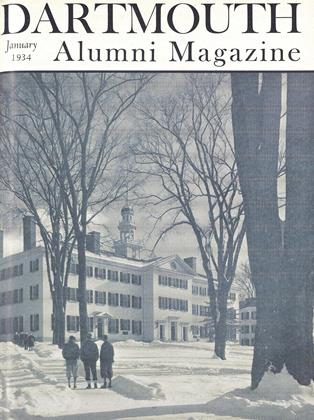The Dartmouth reported a merger between the Arts and the Round Table, a Vox-Pop denied it, a merry Vox-Pop waxed facetious about it, and finally Junto was born. It seems that both the Arts and Round Table have been left to die their several unmourned deaths, and that a new organization, The Junto, has come to take its place. The campus heaved a sigh of relief, mopped its brow, and took in the early show at the Nuggett.
Yet we consider this new move one of the most significant in recent years. Briefly stated, the Board of Governors flatly decided to have done with phoniness esthetically and with apathy politically. Their platform calls for a correlation of the "artistic" field with the "practical." They believe that some comprehension of both is essential for an adequate understanding of modern life.
That the new organization will not be baying at the moon (in the Yellow River, as Mr. Hymen would have put it) was indicated by the turnout for the John Strachey lecture, first of the series to be sponsored by The Junto. Mr. Strachey spoke on "The Coming Struggle for Power" —an analysis of the collapse of capitalism, demonstrating how the nations are headed inevitably for another World War. The address was taken for the most part in a tolerant spirit, which convinces us that the depression has taught this former Republican stronghold a lesson of some sort. Thinking will be done on such questions, at least, as where the ten-thousand-a-year jobs have gone; and with this as its opening wedge. The Junto should accomplish a good deal more than its predecessors.
The Dartmouth College Concert Series has likewise been launched, and according to ticket-sales, Hanover is still a humming nest of music-lovers. The "dramatic soprano" Rosa Ponselle inaugurated this year's program brilliantly enough, and is to be followed by Albert Spaulding, the Hall Johnson Choir, the Budapest String Quartet and—the Hanover Symphony Orchestra. One could ask for little more.
The Dartmouth Union continued one phase of its program—which we regard as the fostering of religious tolerance—with the sponsoring of the "rebel preacher" Bill Simpson. Mr. Simpson reiterated in TheDartmouth' that the church was a "harlot and a prostitute" and attracted a considerable audience to hear how he had reached this and other conclusions.
Not to be outdone, the Dartmouth Players have also broadened their functions to sponsor a symposium on the development of Drama through the ages. Mr. Watson, Mr. Messer and Mr. Henderson have already spoken, and among them have managed to cover the field from Grecian to Shakespearean times. This symposium too has attracted its listeners, and thus it may be said that culture this semester is covering Dartmouth like a rag.
 View Full Issue
View Full Issue
More From This Issue
-
 Article
ArticleHANOVER BROWSING
January 1934 By Rees H. Bowen -
 Class Notes
Class NotesClass of 1910
January 1934 By Harold P. Hinman -
 Class Notes
Class NotesClass of 1929
January 1934 By Frederick William Andres -
 Article
ArticleBUSINESS AND THE COLLEGE MAN
January 1934 By William J. Minsch '07 -
 Class Notes
Class NotesClass of 1933
January 1934 By John S. Monagan -
 Class Notes
Class NotesClass of 1908
January 1934 By Laurence W. Griswold
S. H. Silverman '34
-
 Article
ArticleArtist, Designer, Caricaturist
May 1934 By Abner Dean '31, S. H. Silverman '34 -
 Article
ArticleTHE UNDERGRADUATE CHAIR
October 1933 By S. H. Silverman '34 -
 Article
ArticleLUCKY '37!
By S. H. Silverman '34 -
 Article
ArticleDEATH AND DARTMOUTH
April 1934 By S. H. Silverman '34 -
 Article
ArticleJUST FOR A CHANGE
April 1934 By S. H. Silverman '34 -
 Article
ArticleTHE OTHER SIDE
April 1934 By S. H. Silverman '34








